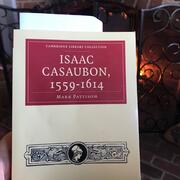Good morning all! I was thinking about what I share on this blog, and I realized I have confined myself mostly to texts or issues that were already on-line--in other words, articles I found online, or emailed information, or what have you. But most of what I do (seriously) (still) is off-line. So I thought, I should figure out a way to talk about stuff I find off-line.
This is an attempt at that. I'll try to write up book reports and the like of things I've been reading, when I think it might be interesting to report. This isn't everything I look at, but it's a fair amount.
So. One today:
I have spent the last several weeks slowly reading a book I have wanted to read for sometime, the study of the 16th and 17th century scholar Isaac Casaubon, by the 19th century Victorian Oxford Don Mark Pattison.
I have been interested in Pattison for sometime. He was someone who tried to be a scholar in 19th century Oxford, when that vocation, in that location, was not as easy to pursue as it became later. He led a kind of disappointed life, frustrated in many ways, not least by himself and his own expectations of himself. His Autobiography is remarkable, as are his essays.
He seems to have seen Casaubon as a figure of real significance for the history of scholarship, and as something of an exemplar for the life he wanted to lead, as well. His encounter with Casaubon became immortalized when George Eliot produced Middlemarch, in which a dry-as-dust scholar named "Casaubon" was rumored to have been modeled after Pattison. It's hard not to believe that that too was at least a little bit true.
It’s interesting to think about what Pattison was trying to do with this book. In a way, it anticipates by more than a century the kind of work that we have seen scholars such as Anthony Grafton deal on Renaissance and Reformation scholars – – that is, on earlier generations' versions of themselves.
Casaubon is clearly a model for Pattison, not just professionally but in some way personally. The struggles he reports Casaubon as facing – – struggles to find quiet, to find a stable place to live with his family, struggles over religious orthodoxies, both those (Roman Catholics) who called him a heretic and those who expected him to be an Orthodox Calvinist – – all of these things are things that Pattison would have sympathized with.
What I find moving in the book is it overall vision, as well as a number of fascinating little details. The struggle between Casaubon and DuMornay, a French Calvinist preacher located in Paris who expected Casaubon to support his side of all arguments; the idea that an early 17 century Roman Catholic critic of Calvinism noticed similarities between Calvinism and certain manifestations of Islam, while almost certainly purely polemical, Is very interesting as well; Michael Walzer's The Revolution of the Saints, coupled with Olivier Roy's Globalized Islam, noticed similiar analogies in the twentieth centruy. The tension between “the theologian and the scholar" is very interesting as well.
Most deeply, I was looking for clues about what kind of a life this is, the life of scholarship, and I believe I found a couple of them. This is an interesting line:
learning is a peculiar compound of memory, imagination, scientific habit, accurate observation, all concentrated, through a prolonged period, on the analysis of the remains of literature. The result of the sustained mental endeavor is not a book, but a man.
(This is good advice for people working on a dissertation, by the way. But that's another post.)
There's lots of other things here, including an ongoing discussion of the importance of patience in scholarship, and the way that the real motivations of this vocation are never fame, nor wealth, nor any outward blessings or benefits, but some kind of transcendental ideal of simply getting things right; an ideal before which, inevitably, we are bound all to be, more or less, disappointments.
